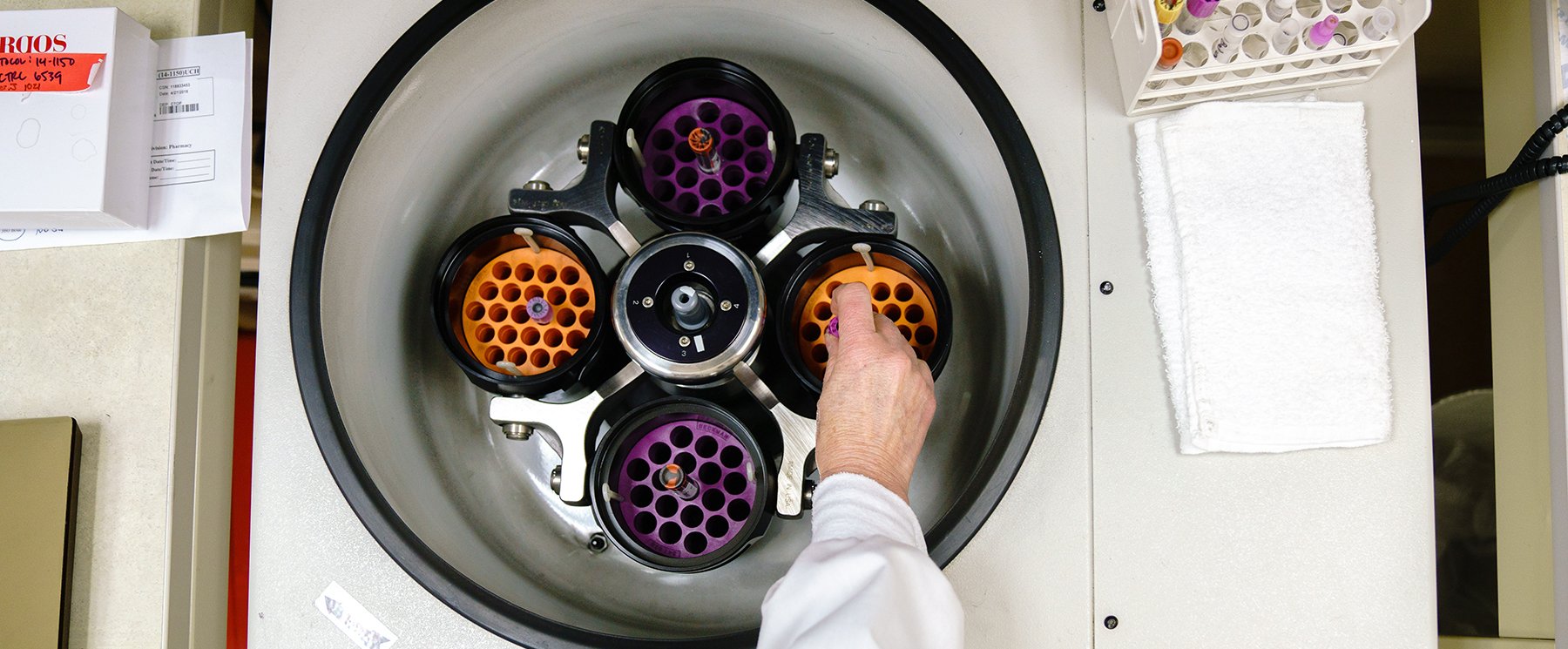Teams working around the clock to find effective and safe therapies
Doctors and nurses-many of whom are also researchers-are working around the clock at University of Colorado Hospital (UCH) to treat patients who are hospitalized with COVID-19. Over the next several months, research teams and caregivers will treat patients using four different drugs in the course of multiple clinical trials using Sarilumab, Remdesivir and Hydroxychloroquine.
Infectious disease expert Thomas Campbell, MD, says it is important to remind the public of the lack of proven treatment options. "This virus has come upon us very quickly, and when we treat patients we have a very limited box of tools-most of which we have no idea if they work," says Campbell, professor of infectious diseases in the CU School of Medicine and medical director of the CCTSI's Clinical and Translational Research Center at University of Colorado Hospital. "So it is important to do carefully designed and controlled clinical research to find out what does work and what is safe."
Sarilumab
One of the studies Campbell is leading at UCH employs a therapeutic called Sarilumab (Regeneron Pharmaceuticals), which was previously approved by the Food and Drug Administration (FDA) to treat patients with rheumatoid arthritis. It has been "fast tracked" by the FDA to use in the fight against COVID-19.
Sarilumab, an IL-6 receptor antagonist, works to calm what people have been calling the "cytokine storm" or a dangerous overreaction of the immune system. Some people who get very ill with COVID-19 have a very high inflammatory response even after the virus is no longer a threat, and the body continues to release cytokines, which may actually attack multiple organs including the lungs and liver. This suggests that the problems some patients experience in terms of respiratory failure may be driven by the body's response against the virus. "And if that is true, then calming or attenuating the hyper-inflammatory response might prevent damage to the lung that drives respiratory failure," Campbell says.

Twenty-two individuals have enrolled in this trial so far. It is a double blind study designed with a placebo arm, which means that patients and doctors do not know if they are receiving the drug or a placebo. So far, Campbell says, "Some have done very well. Whether that is due to the study treatment or is just the natural course of their illness I will not know until the end of the study when unblinding occurs and we can associate the outcome with the assigned treatment."
Remdesivir
Two studies that use Remdesivir (Gilead Sciences), an antiviral drug, are taking place at University of Colorado Hospital. Campbell is leading both studies. Remdesivir blocks the virus' ability to replicate its genetic material so it is unable to reproduce itself and spread. Drugs that are used to treat HIV or herpes work in the same way as Remdesivir. One of these studies just started enrolling patients on April 9 and has enrolled 8 participants so far. The drug will be tested in hospitalized patients with mild COVID-19 cases and in patients who are experiencing more severe cases.
Hydroxychloroquine
Two trials of Hydroxychloroquine, which is the drug that has probably been discussed the most in the media, are being conducted for early treatment of hospitalized patients and in those not needing hospital treatment to prevent hospitalization. Both trials at University of Colorado Hospital are being led by Drs. Marc Moss and Adit Ginde. The study that involves hospitalized patients was launched in the first week of April and is actively enrolling participants.
Hydroxychloroquine is an antimicrobial agent with immunomodulatory and antiviral properties that has demonstrated in vitro (in the lab) activity against SARS-CoV-2, the virus that causes COVID-19. It has been approved by the FDA for the treatment of malaria, lupus and rheumatoid arthritis; in late March the FDA authorized it for emergency use.
Research Nursing
Essential to these studies are specially trained research nurses. Both the Remdesivir and Sarilumab studies are using CCTSI's mobile nurses from the UCH Clinical and Translational Research Center. These nurses go to the patient wherever they may be in the hospital in order to conduct COVID-19 study visits. The research nurses provide treatments, which have to be given by IV infusion, and collect research specimens in terms of blood tests and nasal swabs. "Using specialized research nurses for these procedures leaves the floor nurses free to take care of the patients' clinical needs," says CCTSI Director of Operations Dr. Janine Higgins. "This long-standing partnership between UCH and the CCTSI is just one reason that CU Anschutz faculty have been able to start so many COVID-19 research studies quickly and effectively."
Convalescent Plasma
Another experimental treatment (though technically not a clinical trial) that is being studied on the CU Anschutz Medical Campus is what is known as "convalescent plasma." Last week, the University of Colorado Hospital became the first in the state to treat a COVID-19 patient by transfusing plasma that contains antibodies from a donor who contracted COVID-19, recovered, and then donated the plasma to the blood donor center at the Children's Hospital Colorado. The hope is that the infusion of antibodies will help strengthen a patient's immune system and provide greater ammunition to fight COVID-19. So far, the patient who received the plasma seems to be improving, though the cause of any improvement is unclear.
To donate convalescent plasma to Children's Hospital Colorado during the pandemic, call 720-777-3557 or email [email protected]. Only those who are confirmed positive for COVID 19 are currently eligible to donate.
Guest contributor: Wendy S. Meyer, Colorado Clinical and Translational Sciences Institute






